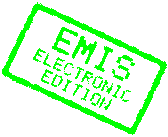On the cyclically fully commutative elements of Coxeter groups
T. Boothby
, J. Burkert
, M. Eichwald
, D.C. Ernst
, R.M. Green
and M. Macauley6
6Received: 10 August 2011 / Accepted: 20 October 2011 / Published online: 19 November 2011 \copyright Springer Science+Business Media, LLC 2011 Abstract Let W be an arbitrary Coxeter group. If two elements have expressions that are cyclic shifts of each other (as words), then they are conjugate (as group elements) in W . We say that w is cyclically fully commutative (CFC) if every cyclic shift of any reduced expression for w is fully commutative (i.e., avoids long braid relations). These generalize Coxeter elements in that their reduced expressions can be described combinatorially by acyclic directed graphs, and cyclically shifting corresponds to source-to-sink conversions. In this paper, we explore the combinatorics of the CFC elements and enumerate them in all Coxeter groups. Additionally, we characterize precisely which CFC elements have the property that powers of them remain fully commutative, via the presence of a simple combinatorial feature called T. Boothby Simon Fraser University, Burnaby, BC, VSA 156, Canada
DOI: 10.1007/s10801-011-0327-z
Abstract
Let W be an arbitrary Coxeter group. If two elements have expressions that are cyclic shifts of each other (as words), then they are conjugate (as group elements) in W. We say that w is cyclically fully commutative (CFC) if every cyclic shift of any reduced expression for w is fully commutative (i.e., avoids long braid relations). These generalize Coxeter elements in that their reduced expressions can be described combinatorially by acyclic directed graphs, and cyclically shifting corresponds to source-to-sink conversions. In this paper, we explore the combinatorics of the CFC elements and enumerate them in all Coxeter groups. Additionally, we characterize precisely which CFC elements have the property that powers of them remain fully commutative, via the presence of a simple combinatorial feature called a band. This allows us to give necessary and sufficient conditions for a CFC element w to be logarithmic, that is, \ell ( w k )= k\cdot \ell ( w) for all k\geq 1, for a large class of Coxeter groups that includes all affine Weyl groups and simply laced Coxeter groups. Finally, we give a simple non-CFC element that fails to be logarithmic under these conditions.
Pages: 123–148
Keywords: keywords Coxeter groups; cyclic words; fully commutative elements; root automaton
Full Text: PDF
References
1. Björner, A., Brenti, F.: Combinatorics of Coxeter Groups. Springer, New York (2005) J Algebr Comb (2012) 36:123-148
2. Brink, B., Howlett, R.B.: A finiteness property and an automatic structure for Coxeter groups. Math. Ann. 296, 179-190 (1993)
3. Callan, D.: Pattern avoidance in circular permutations (2002).
4. Dyer, M.: Private communication
5. Eriksson, H.: Computational and combinatorial aspects of Coxeter groups. Ph.D. thesis (1994)
6. Eriksson, H., Eriksson, K.: Conjugacy of Coxeter elements. Electron. J. Comb., 16(2), #R4 (2009)
7. Geck, M., Pfeiffer, G.: Characters of Finite Coxeter Groups and Iwahori-Hecke Algebras. Oxford University Press, London (2000)
8. Green, R.M.: Full heaps and representations of affine Kac-Moody algebras. Int. Electron. J. Algebra 2, 137-188 (2007)
9. Krammer, D.: The conjugacy problem for Coxeter groups. Groups Geom. Dyn. 3, 71-171 (2009)
10. Macauley, M., Mortveit, H.S.: On enumeration of conjugacy classes of Coxeter elements. Proc. Am. Math. Soc. 136(12), 4157-4165 (2008)
11. Macauley, M., Mortveit, H.S.: Posets from admissible Coxeter sequences. Electron. J. Comb. 18(1), #R197 (2011)
12. Matsumoto, H.: Générateurs et relations des groupes de Weyl généralisés. C. R. Acad. Sci. Paris 258, 3419-3422 (1964)
13. Sloane, N.J.A.: The on-line encyclopedia of integer sequences (2011). Published electronically at
14. Speyer, D.E.: Powers of Coxeter elements in infinite groups are reduced. Proc. Am. Math. Soc. 137, 1295-1302 (2009)
15. Stanley, R.P.: Acyclic orientations of graphs. Discrete Math. 5, 171-178 (1973)
16. Stembridge, J.R.: On the fully commutative elements of Coxeter groups. J. Algebr. Comb. 5, 353-385 (1996)
17. Stembridge, J.R.: The enumeration of fully commutative elements of Coxeter groups. J. Algebr.
2. Brink, B., Howlett, R.B.: A finiteness property and an automatic structure for Coxeter groups. Math. Ann. 296, 179-190 (1993)
3. Callan, D.: Pattern avoidance in circular permutations (2002).
4. Dyer, M.: Private communication
5. Eriksson, H.: Computational and combinatorial aspects of Coxeter groups. Ph.D. thesis (1994)
6. Eriksson, H., Eriksson, K.: Conjugacy of Coxeter elements. Electron. J. Comb., 16(2), #R4 (2009)
7. Geck, M., Pfeiffer, G.: Characters of Finite Coxeter Groups and Iwahori-Hecke Algebras. Oxford University Press, London (2000)
8. Green, R.M.: Full heaps and representations of affine Kac-Moody algebras. Int. Electron. J. Algebra 2, 137-188 (2007)
9. Krammer, D.: The conjugacy problem for Coxeter groups. Groups Geom. Dyn. 3, 71-171 (2009)
10. Macauley, M., Mortveit, H.S.: On enumeration of conjugacy classes of Coxeter elements. Proc. Am. Math. Soc. 136(12), 4157-4165 (2008)
11. Macauley, M., Mortveit, H.S.: Posets from admissible Coxeter sequences. Electron. J. Comb. 18(1), #R197 (2011)
12. Matsumoto, H.: Générateurs et relations des groupes de Weyl généralisés. C. R. Acad. Sci. Paris 258, 3419-3422 (1964)
13. Sloane, N.J.A.: The on-line encyclopedia of integer sequences (2011). Published electronically at
14. Speyer, D.E.: Powers of Coxeter elements in infinite groups are reduced. Proc. Am. Math. Soc. 137, 1295-1302 (2009)
15. Stanley, R.P.: Acyclic orientations of graphs. Discrete Math. 5, 171-178 (1973)
16. Stembridge, J.R.: On the fully commutative elements of Coxeter groups. J. Algebr. Comb. 5, 353-385 (1996)
17. Stembridge, J.R.: The enumeration of fully commutative elements of Coxeter groups. J. Algebr.
© 1992–2009 Journal of Algebraic Combinatorics
©
2012 FIZ Karlsruhe /
Zentralblatt MATH for the EMIS Electronic Edition
